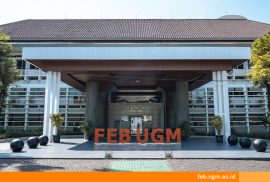As part of the 27th Anniversary of the Master of Development Economics Study Program (MEP) Faculty of Economics and Business UGM, on Friday (10/06), a Development Economics Discussion Forum was held with the theme “Strategies for Implementation of Regional Tax Management in accordance with Indonesian Law no. 1 of 2022 and Efforts to Optimize Regional Revenue Earning.” The Discussion Forum was held offline at the Hyatt Regency Hotel Ballroom and also online via Zoom Meetngs and MEP FEB UGM’s YouTube Channel. Present as a speaker at the discussion forum was Dr. Akhmad Makhfatih, M.A., a Lecturer in the field of Economics at FEB UGM.
The event began with remarks from the Head of the MEP FEB UGM Study Program, Akhmad Akbar Susamto, M.Phil., Ph.D., and continued with a presentation session by the speaker, who was moderated by Amirullah Setya Hardi, Cand. Oecon, Ph.D. Before discussing the strategy for implementing regional tax management, Akhmad Makhfatih gave an explanation of Indonesian Law no. 1 of 2022, or the Law on Financial Relations between the Central Government and Regional Governments (UU HKPD). The HKPD Law aims to equalize the people’s welfare with an effective and efficient allocation of national resources through transparent and accountable financial relations between the central and regional governments. This can be achieved by strengthening the quality of regional expenditures, strengthening regional fiscal capacity, and harmonizing central and regional expenditures.
Based on the material explanation from Akhmad Makhfatih, the HKPD Law includes topics related to restructuring local taxes and simplifying types of retribution. One of the ways to restructure local taxes is to simplify tax administration so that the benefits obtained are greater than the collection costs. In addition, tax restructuring will also make it easier to monitor tax collections and support the public in fulfilling their tax obligations with simplification. Meanwhile, related to the simplification of regional retribution, the number of retributions which initially amounted to 32 types was simplified to 18 types, which were divided into three classifications, namely general services, business services, and certain permits.
Furthermore, in this discussion forum, Akhmad Makhfatih explained that there are fiscal incentives that can be given to business taxpayers with certain criteria including micro- and ultra-micro businesses. The provision of fiscal incentives would be realized through the application of taxpayers by the regional head and is stipulated in a Regional Head Regulation, with notification provided to the DPRD. The fiscal incentive effort is a form of government support for MSMEs.
Regarding the implementation of the HKPD Law in the Regency/City, it is planned that the HKPD Law should be implemented from the year 2024. In the next one and a half years, several stages that need to be carried out include the NJOP ratio analysis, SPPT simulation, and preparing basic academic recommendations for the regional regulations draft. The implementation of the HKPD Law is not without obstacles and limitations, in fact there are several factors such as human resource assessors in the regions, simulation of social impacts after the NJOP update, and the study budget.
At the end of the event, a KAFEGAMA MEP Conference was also held with the aim of selecting the chairperson and the team for the KAFEGAMA MEP format. The conference took place in two plenary sessions which ratified the rules of the conference and held a vote. At the end of the plenary session, based on the results of the most votes, nine members of the KAFEGAMA MEP team were elected.
Reportage: Kirana Lalita Pristy.




